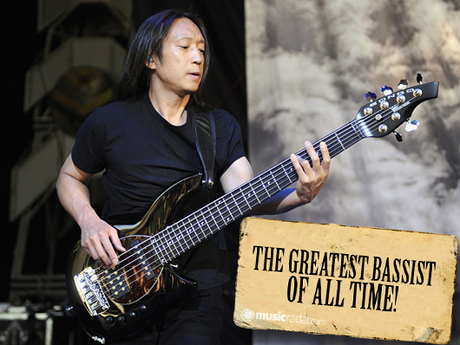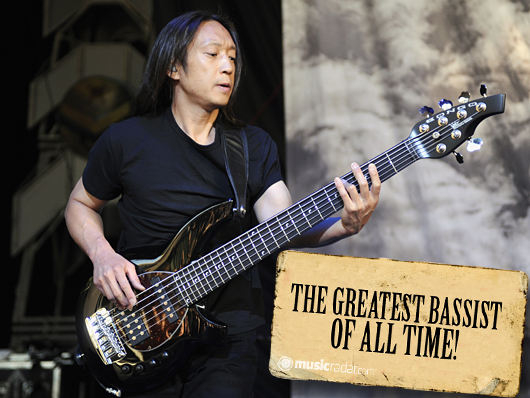
Want all the hottest music and gear news, reviews, deals, features and more, direct to your inbox? Sign up here.
You are now subscribed
Your newsletter sign-up was successful

John Myung on stage with Dream Theater in June 2010. © Tim Mosenfelder/Corbis
Dream Theater's bassist John Myung is a man of few words. He rarely gives interviews, preferring to let his six-string do the talking. But when he found out that he won MusicRadar's Greatest Bassist Of All Time poll, beating such legends as Paul McCartney, James Jamerson, John Entwhistle, and even some of his personal heroes (Chris Squire, Geddy Lee, Steve Harris), the soft-spoken musician described the accolade thusly: "This is very heavy!"
Heavy, indeed: Myung walked away with the title handily, racking up a staggering 42 percent of your votes. Clearly, you like him. You really like him!
Such good news comes at a welcome time for Myung and the millions of Dream Theater fans across the globe who are still reeling from the sudden (and most unexpected) departure of founding member and drummer Mike Portnoy.
In the following interview with MusicRadar, a most humbled and gracious John Myung talks about his huge bass poll win, his relationship with fans and his practice routine. He also discusses the future of Dream Theater without Mike Portnoy.
The 'Greatest Bassist Of All Time.' That's quite an honor - and a stunning testament to the devotion of your fans. But how do you even respond to such a title? Is it all too overwhelming?
"It definitely an honor. I view it as a social endorsement that reflects on a lot of different things, from the band I'm in to the records we've put out to the basses I play. But it's quite an honor, absolutely, one which tells me I'm on the right path. My gratitude goes out to everyone who voted.
Want all the hottest music and gear news, reviews, deals, features and more, direct to your inbox? Sign up here.
"But I, in no way, feel that it's true in the sense of the title of the award, because there's so many great players all over the world who contribute amazing music. So, even though I'm deeply flattered and appreciative, let's say that it's taken with a bit of objectivity."
Is that your way of saying, "I'm not worthy"?
"Exactly. [laughs] You have to keep these things in perspective."
When Slipknot's Joey Jordison won the Rhythm magazine Greatest Drummer Of The Last 25 Years poll, he described the feeling as "bigger than winning a Grammy." Do you feel the same way - or would you still like that Grammy anyway?
"I can relate to that statement, since there's something unique about this award. Unlike the Grammys, it's uncalculated and natural. With the Grammys, there's a whole process that's involved. This is real life; it's about as real as real gets. As a result, I feel very connected to a lot of people. It's a vote of confidence, as though people are telling me, 'We trust you and expect you to continue to do your best.' It's… it's very heavy! It definitely has me humbled."
How do you feel about your relationship with your fans? Obviously, they hold you in high regard. Do you feel a sense of duty to please them, or do you feel that, as an artist, you have only yourself to answer to?
"You know, there's a lot of people reaching out to me, and when that happens, when you get the kind of positive reinforcement that I get, it's bound to make you feel good, and it's definitely going to push you to do your best.
"Moving forward, I think all I can do is put my instincts to work and do my best and hope that I'm on the same page as everyone else.
"The fact that there's an audience out there that accepts what I do is a huge source of stimulation, motivation and energy. I wouldn't be where I am without them. The audience is a big part of this whole thing. At the same time, yes, I have to be myself because that's how it all began. So what I do is, I take in the energy from the fans, but I have to give what I have inside me and push it outward - if that makes any sense." [laughs]
With all due humility, do you consider yourself to be a great bass player, or do you still think you have a long way to go?
"I see myself as having a long way to go. I have a lot of ideals that I would like to reach, but as life goes on, ideals are just that - ideals. To me, living a focused and balanced life is one of the biggest challenges for me, especially as you get older.
"Music is about life; it's about putting your living into your music. So first, once must live. There's a great quote by Sergei Rachmaninov that really sums it all up for me: 'Music is enough for a lifetime, but a lifetime is not enough for music.'"
That's a fantastic way of looking at it.
"Absolutely. It's what adds the realness to this. It's what makes it matter."
What are your thoughts on some of the other players who were on our list? I know bassists such as Chris Squire, Geddy Lee and Steve Harris were big influence on you.
"Without a doubt. Those three players really mean something to me since they inspired me to play, to go out and buy a bass guitar and to want to be a musician. They still inspire me to this day.
"Touring with Iron Maiden this past summer was an awesome experience for me, to be playing with a band that was very responsible for bringing me into music. And just a couple of weeks ago, I went out and saw Rush on their Time Machine tour, and they were incredible. I was so blown away. It's like… they're still doing it to me! [laughs] All of the players you mentioned, they're unbelievable. I respect them so much.
"But you know, there's so many other players: Jeff Berlin, Marcus Miller, Billy Sheehan, Jaco Pastorius, Tony Levin. The list becomes quite long. I could try to name them all, but I wouldn't want to leave anybody out."
You're famous for playing six-string basses. What models are you currently using? Do you see any changes to your instruments in the near future?
"That's a really good question. I've been playing a Bongo bass by Ernie Ball Music Man, and I've been experimenting with different neck and body dimensions over the last year. It's actually really hard to make changes when it comes to spacing and body mass - there's so much retooling that has to go on.
"But the company has been really cool in listening to my thoughts about where the bass needs to go in terms of body mass and neck spacing. Just a few weeks ago they sent me a combination that has really worked for me, so I hope it'll turn out to be a new model."
Do you have any kind of practice routine you adhere to? When you're at home or on tour, what do you do to keep in shape musically?
"Actually, for a while I was into just playing, and I could never understand why I liked to do that. And then I realized that that was how I got my energy, just repeating these sort of mindless finger patterns. I would notice that after I played, I felt centered and energized. I felt a great sense of well-being. It's the same sort of thing that happens when people meditate.
"What I've done now, though, since I've been home is I've broken out the Bach cello book, and I've found that the range of the cellist is very comparable with the six-string bass. So rather than do mindless exercises, I decided to apply myself to learning some of these pieces. A different part of your brain takes over."
Shifting gears, obviously everybody is still a little shocked over Mike Portnoy's decision to leave the band. What are your thoughts? Did you see this coming? Do you wish some sort of compromise could have been worked out?
"I can't say I saw it coming. And of course, nobody likes conflict. Dream Theater works best as a creative unit, and it's not going to be easy to find a replacement and have somebody we can really bond with.
"I'd say the general band vibe is positive. We're looking for the right guy, and I'm sure we'll find that person."
More so than any other member, you're bound to be impacted by a new drummer - after all, the rhythm section is the bedrock of a group. Are you excited to play with somebody new?
"I'd say we're all impacted, because we all interact with the rhythms. So this isn't going to affect me more than anybody else, really. Creatively, the Dream Theater process has always been extremely collaborative - there's always been plenty of input from everybody - so when working with somebody new, we're going to have to look for those common ground points that we have. A new member will be influential, no doubt. Hopefully, new directions will open up. I think it can be cool."
It has been suggested that Mike may change his mind in a year or so, that he might want to rejoin. If so, would you welcome him back with open arms, or do you see this as a necessary, clean break?
"Anything is possible. But right now, the band is focused on finding a new member to get in the studio with. We want to make a great record that we're happy with and have a great next tour. That's what we do, and that's what we're looking at."
Any last words for all the fans and readers who voted for you in such huge numbers?
"I feel fortunate to have won this award. Playing bass and being a musician is an important part of who I am, and to have the people's support, it's the best. And to up-and-coming players, I'd just like to tell them to be psyched about what they're doing musically. Put in the time, be as good as you can be… and I'll be doing the same!"
Liked this? Then read The Greatest Bassists Of All Time - as voted by you!
Connect with MusicRadar: via Twitter, Facebook and YouTube
Get MusicRadar straight to your inbox: Sign up for the free weekly newsletter
Joe is a freelance journalist who has, over the past few decades, interviewed hundreds of guitarists for Guitar World, Guitar Player, MusicRadar and Classic Rock. He is also a former editor of Guitar World, contributing writer for Guitar Aficionado and VP of A&R for Island Records. He’s an enthusiastic guitarist, but he’s nowhere near the likes of the people he interviews. Surprisingly, his skills are more suited to the drums. If you need a drummer for your Beatles tribute band, look him up.
